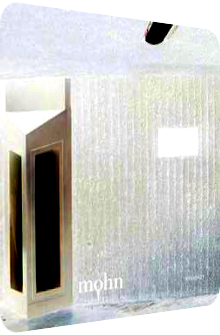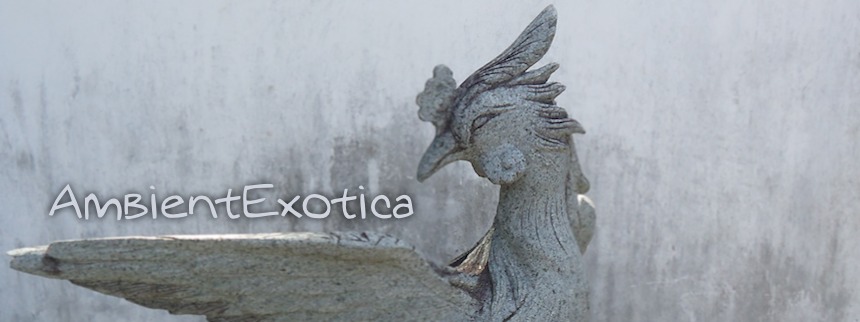
Mohn
Mohn
2012
Mohn is the Ambient superduo, if you will. Longtime friends and Ambient producers Wolfgang Voigt and Jörg Burger don’t team up for the first time, as they have collaborated a few times before. Their track Frieden on Pop Ambient 2009 is one example of a typical short-lived collaboration, where their ways depart only to cross again for another song or two. But with their self-titled release Mohn, things are much different and more focused. Nine tracks are gathered on this album, with one additional track on the digital download version. Both musicians are highly-skilled veterans of the genre, both have set the boundaries of the subgenre called Pop Ambient, so all traces and strong reminiscences of this very genre can be found aplenty on Mohn. However, the duo comes up with an eclectic, electrifying potpourri of varied tracks which, strangely enough, is still cohesive and harmonious despite the many stylistic branches. There are scents of Voigt’s works he delivered under his monikers Gas and All as well as imprints of Burger’s Triola compositions. By no means do both artists fire out one saccharine glitz tune after the other on this album! The atmosphere varies from nostalgia over balminess to mystique. So far, so trivial. What makes this release so special are the various moments of darkness and gloom that are featured on most compositions as well as the slow beats. Now you’ve heard Dark Ambient tracks before, and nostalgic chords are commonplace elements in Ambient music too, but the beats are really special on here. They’re not structured in a pumping, club-compatible 4/4 way as Voigt did it on his Gas project, but tremendously baneful, murky and intimidating. Together with their long sustain, they are all the more powerful and imply another particularity: their fade-out phase can only be heard if it isn’t covered by a dense synth thicket. And indeed are the synths reduced overall. They are still here, they wash over the listener and remain cozy, mysterious or soothing, but the intermixture of space and sound is now quite important. Such absolutist allegations aren’t helpful in the end, I know, for Burger and Voigt created so many different kinds of music; eminently harsh beats or darker moods hence aren’t something new per se. There have been dark Pop Ambient tracks before. But the revved up energy and spiraling bits have never been featured this prominently in compositions by either Voigt or Burger. And the album starts with a surprise, at least for me, as you can see below.
Several abyssal bass drones that are traversed by eerie glitters and the long sustain of two-note electric buzzes mark the surprisingly nocturnal beginning of Mohn’s kick-off: Einrauschen (a German pun roughly translatable as hissing/swooshing warm-up) describes in the most fitting manner what is going on. A synth thicket of dense layers fades in slowly, a bold indicator of the Pop Ambient genre, but without any warmth. It’s a creepy loop that encapsulates remnants of brazen clangs and clicks. And that’s the description of the first tune already. Instead of balmy synth washes, the arrangement is a reminiscence to Voigt’s Ambient material as Gas, distantly similar to Königsforst 3, but more metallic and vault-like. The intimidating and equally gloomy Schwarzer Schwan (black swan) merges the spectral vibrato fragments of an opera singer, combines them with a synth choir and filters the living daylights out of the timbre, thus leaving a loop of androgyny and iciness. As if that wasn’t alienating enough, Burger and Voigt drop a slowly stomping gunshot (!) beat whose reverb resonates and fades out far in the pitch-black distance. Dark 80’s synth pads mesh with the whirring murkiness. After more than three minutes, the first glimpses of brightness are introduced as the synth pads are pitched to upper regions, but it isn’t before the fourth minute that a repeated motif of spacey flute sparks add short moments of expanded luminescence. Since the final phase of Schwarzer Schwan doesn’t include these scintillating elements, it ends as it began – in obscurity. Up next is the terrific Ambientôt, a subsequently obvious but never used before genre-propagating pun of the French goodbye, and it finally injects the warmth that is not necessarily expected by the duo’s solo works, but nonetheless welcome. A schlepping beat with frizzling shakers resides among a warm acoustic guitar-synth concoction akin to Voigt’s terrific All arrangements. The beautiful melancholy is further refined by rhythmically pulsating two-note synth sweeps that are much more magnanimous in their delivery of warmth than the previous fabrications. The middle section goes a bit honky-tonk, as traces of Italo piano-esque synths play a vestigial melody which is rounded off by blazingly bright strings of frost. It’s a wonderful tune that harks back to the salad days of All and the beginning of the Pop Ambient movement at the turn of the millennium.
Saturn is a mercurial (!) track full of contradictory devices, but they effectively form a soothing unison of harmony. Dark Synth Pop pads are accentuated by mellifluously fuzzy cymbal glitters and Thomas Fehlmann-like synth eruptions or modulated scintillae of the sublime kind. Galactic bells float by, their reverbs clash and elucidate the mélange of space and sound, emptiness and waves. The addition of mystical-majestic synth strings can be linked back to Burger’s Triola moniker, and especially so to tracks like Dunkelraum, his contribution to Pop Ambient 2011. It’s a gargantuan Ambient track with a cozy, mollifying form of darkness. The listener can submerge, but never gets lost in overly thick superstructures. While the vintage Seqtor 88 contains further traces of Voigt’s moniker and interweaves these melancholic traits into wonky chords, pink noise particles, vivacious spirals and a super-mellow beat, Das Feld is the most tranquilizing track of Mohn, residing on the Drone spectrum of the genre with hazy streams of sizzles, the dark but cozy monotony of synth washes, crystalline creeks of resplendent purity and the positively somniferous essence of gently oscillating beams of brilliancy. Ebertplatz 2020, on the other hand, compounds the ethereality of a hauntingly cinematic synth string melody with a belly-massaging acidity of sawtooth accompaniments, all the while a seraphic glow illuminates the synergetic nature of post-apocalyptic depth and lightweight loftiness. The tension and moments of uneasiness are much more perceptible, though. The titular Mohn uses a five-note theme on the electric piano and juxtaposes it to a two-note bassline, twinkling cymbals and awesome synth bursts of an enigmatic twilight. The beatless middle section is of particular interest, as the missing beats allow a glimpse onto the wafting curlicues that whirred in the background all the time, but weren’t perceptible beforehand, namely steel guitar-like droplets. The final Wiegenlied (lullaby) is a fantastic outro that links back to Triola’s Tropfstein off Pop Ambient 2006. Thermal heat-injecting synth washes are amplified by warped pad gurgles, auspiciously liquid water drops and beats like thunderclaps whose sustain escapes into the wide distance of the cave. After four minutes, the song gets even better as Voigt and Burger expand the celestial sphere with the help of a multicolored, shimmering synth melody that is at first isolated and then integrated into a climactic maelstrom of sparkles, waves, noises and particles, before these fade out as well and leave the thunderous bass drum all by itself. It’s a fantastic closing track on the CD. The digital download version adds a tenth track, Das Ultimatum which intermixes flying laser sounds and wind gusts with a classic drum kit downbeat and polyphonous marimba-like synth melodies. The long-lasting synth pads sound like flying hornets or electric current, and the song is similarly energetic and baneful as the first two tracks of darkness. It’s a nice appendix, but I consider Wiegenlied to be the real, most splendid ending of Mohn.
One thing is for sure: Mohn harks back all the time to the long-lasting careers of and the deep friendship between Wolfgang Voigt and Jörg Burger. Such being the case, followers of the duo’s solo works and their several monikers will find the album particularly electrifying and vitalizing. Whether it’s the warm and positively articulated melancholy of Voigt’s All or the similarly cozy but much more mysterious synth streams of Burger’s Triola moniker, Mohn succeed with their intermixture of the past with the present and the post-apocalyptic future. The opening section is terrifically dark and definitely unexpected, and the same can be applied to the sunset-red Ebertplatz 2020, but the rest of the material is much brighter and always eclectic. A huge impact is left by the two kinds of beats that flow through most of the material. Whether it’s the brazenly thundering version that resembles weighty footsteps in dark halls and caves or the eminently mellow and whitewashed balm of the silky brethren, the patterns are surprisingly easy to see through, yet awe-inspiring in the end, for they either merge perfectly with the synthscape or elevate a composition into new dimensions due to the strong and threatening influence they leave. It is still Pop Ambient, and multitextured, ebullient synth sweeps are still an omnipresent ingredient in the majority of the tracks, but the interplay between space and sound is of equal importance, and this can only be accomplished and maintained when the thickness of the synths is reduced. But this is always done with great style, and the little tidbits and pulses that occur when the synths are a bit quieter are usually melodious and at times quirky, but always catchy. Due to the large shedloads of work and hectic release schedules, it is unlikely that the duo will meet again in the near future. But if they come together once again as Mohn, I’ll be all over their forthcoming releases. Their debut is fantastic, and it’s especially recommended to Dark Ambient fans and those who don’t want to clean their ears off the syrupy schmaltz that is often found in sugary Pop Ambient hymns. This album drifts between melancholy, darkness and yes, the occasional suaveness, but the tasty concoction of beats, mystique, warmth, nostalgia and gloom is both coherent and varied enough to be highly satisfying for fans of the Kompakt label in particular and Ambient fans in general. It’s a great work with not one dud if you are open-minded in regard to the various moods.
Further listening:
You can listen to the whole album on the Mohn section of Kompakt.fm.
Ambient Review 109: Mohn – Mohn (2012). Originally published on Aug. 15, 2012 at AmbientExotica.com.
